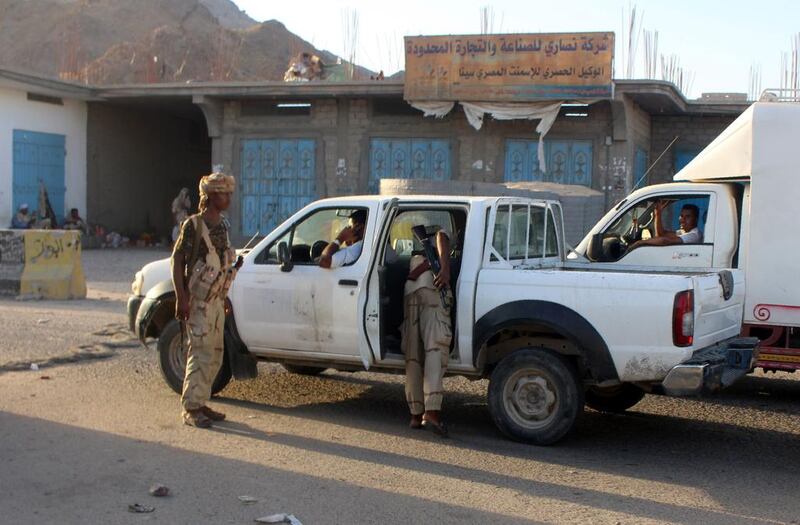ADEN // At least 13 Yemeni troops were killed and dozens injured on Friday in attacks that targeted a naval base near Mukalla and the home of a top military officer.
In an attack claimed by ISIL, two suicide car bombers targeted the naval base in the Khalaf area west of the city while a third bomb targeted the nearby home of Brig Gen Faraj Salmeen, commander of the second military region in Hadramout province, a security source told The National.
“The first suicide car bomber targeted the gate of the naval base, and the second car exploded inside the camp and killed some soldiers, and then clashes broke out between other soldiers and some armed men who arrived at the base in cars after the blasts,” the source said.
He said some soldiers were killed in the bomb blasts while others died in the ensuing firefight that lasted half an hour before the attackers fled.
Simultaneously, a third car bomb exploded outside the home of Brig Gen Salmeen. No deaths or injuries were reported in that attack.
Claiming responsibility for the attack on the base in Khalaf, ISIL identified one of the bombers as Hamza Al Muhajir. It made no mention of the other bomber, however, nor of the attack that targeted the home of Brig Gen Salmeen.
The attacks came shortly before prime minister Ahmed bin Dagher arrived in Mukalla with several ministers on a one-day visit aimed at reviving government institutions in the city, which is the capital of Hadramout province.
It was the prime minister’s first visit to the city since it was liberated last month by Yemeni forces after a year-long occupation by Al Qaeda. Mr bin Dagher held talks with the governor and the provincial government of Hadramout.
On Wednesday, a suicide bomber targeted the convoy of Brig Gen Abdurrahman Al Halili, commander of the first military region in Hadramout, in the province’s Al Qaten district.
Five guards and two civilians were killed, and Brig Gen Al Halili and 14 other people were injured.
That attack was claimed by Al Qaeda, according to Site Intelligence, which monitors militant websites.
Salah Al Amari, a political analyst and editor-in-chief of the state-run 30 November newspaper in Mukalla, said Thursday's attacks were a dangerous development.
“ISIL arrived on Thursday in Mukalla, where there are Yemeni army troops and coalition forces. This is a clear message that they can reach any area they want, so the coalition forces and Yemeni army have to pursue Al Qaeda and ISIL fighters to their strongholds in Hadramout, otherwise they will chase the Yemeni army,” Mr Al Amari said.
Al Qaeda was driven out of Mukalla and nearby coastal towns last month in an offensive by government troops supported by special forces from Saudi Arabia and the UAE.
Both countries are leading members of a military coalition supporting Yemen’s government against Iran-backed Houthi rebels, who are allied to forces loyal to former Yemeni president Ali Abdullah Saleh.
The government is currently engaged in UN-mediated peace talks with the rebels in an attempt to end more than a year of conflict that began when the rebels seized the capital, Sanaa, in 2014. The conflict escalated in March last year when the rebels began seizing more territory, prompting the Saudi-led coalition to intervene.
The UN said on Thursday that the government and rebels had discussed the crucial issues of military withdrawals, the handover of weapons and the restoration of state institutions during the talks.
It was their third day of consecutive face-to-face meetings – the longest run yet in the three-week-old talks being held in Kuwait City.
“Parties began to present their visions on the withdrawals and the handover of weapons, especially mechanisms of withdrawal and assembling of forces,” UN envoy Ismail Ould Cheikh Ahmed said.
He did not say, however, if the teams made any progress on these issues, which are central to any peace settlement in the impoverished nation.
foreign.desk@thenational.ae
* With additional reporting from Agence France-Presse





